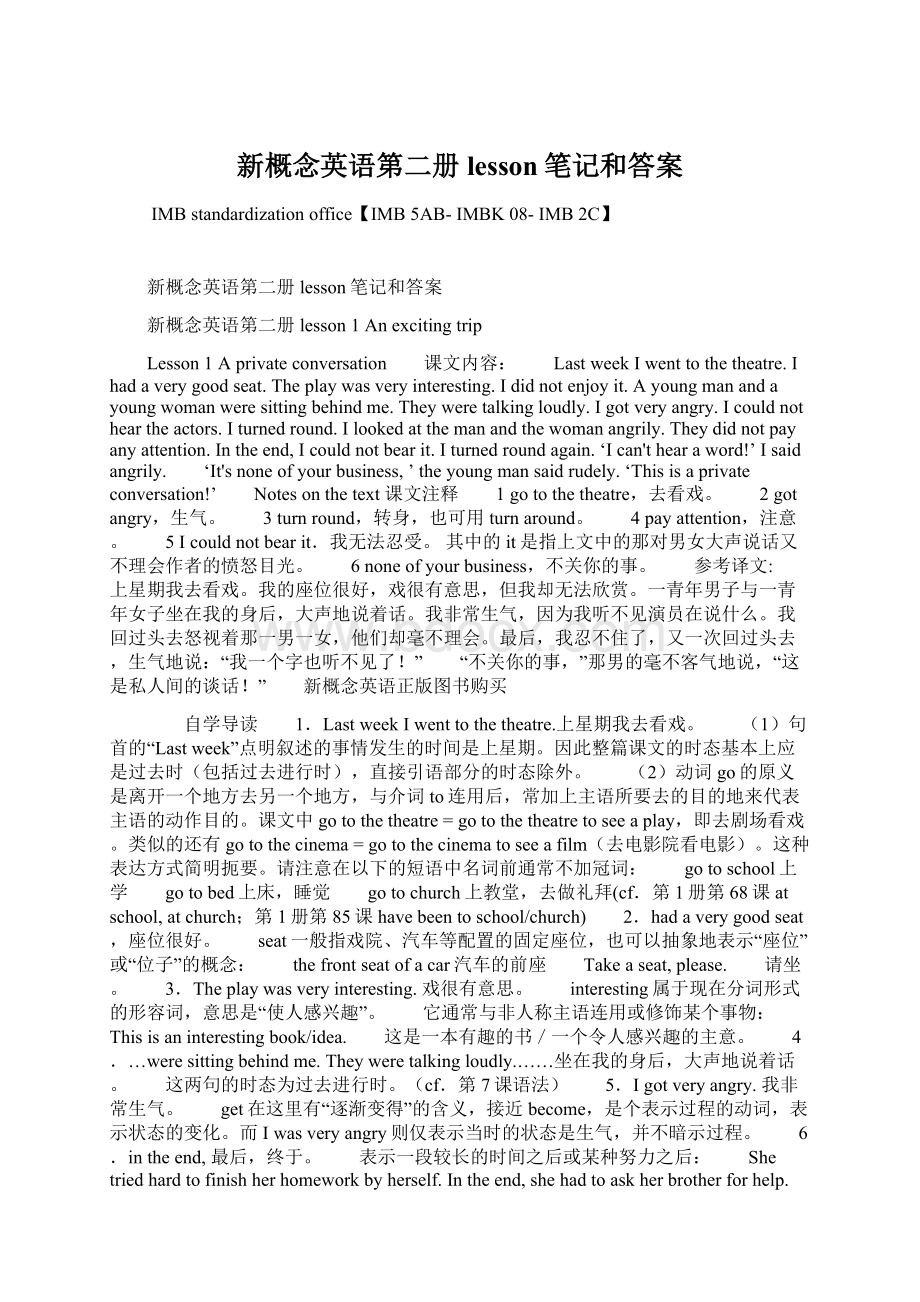新概念英语第二册lesson笔记和答案.docx
《新概念英语第二册lesson笔记和答案.docx》由会员分享,可在线阅读,更多相关《新概念英语第二册lesson笔记和答案.docx(7页珍藏版)》请在冰豆网上搜索。

新概念英语第二册lesson笔记和答案
IMBstandardizationoffice【IMB5AB-IMBK08-IMB2C】
新概念英语第二册lesson笔记和答案
新概念英语第二册lesson1Anexcitingtrip
Lesson1Aprivateconversation 课文内容:
LastweekIwenttothetheatre.Ihadaverygoodseat.Theplaywasveryinteresting.Ididnotenjoyit.Ayoungmanandayoungwomanweresittingbehindme.Theyweretalkingloudly.Igotveryangry.Icouldnotheartheactors.Iturnedround.Ilookedatthemanandthewomanangrily.Theydidnotpayanyattention.Intheend,Icouldnotbearit.Iturnedroundagain.‘Ican'thearaword!
’Isaidangrily. ‘It'snoneofyourbusiness,’theyoungmansaidrudely.‘Thisisaprivateconversation!
’ Notesonthetext课文注释 1gotothetheatre,去看戏。
2gotangry,生气。
3turnround,转身,也可用turnaround。
4payattention,注意。
5Icouldnotbearit.我无法忍受。
其中的it是指上文中的那对男女大声说话又不理会作者的愤怒目光。
6noneofyourbusiness,不关你的事。
参考译文:
上星期我去看戏。
我的座位很好,戏很有意思,但我却无法欣赏。
一青年男子与一青年女子坐在我的身后,大声地说着话。
我非常生气,因为我听不见演员在说什么。
我回过头去怒视着那一男一女,他们却毫不理会。
最后,我忍不住了,又一次回过头去,生气地说:
“我一个字也听不见了!
” “不关你的事,”那男的毫不客气地说,“这是私人间的谈话!
” 新概念英语正版图书购买
自学导读 1.LastweekIwenttothetheatre.上星期我去看戏。
(1)句首的“Lastweek”点明叙述的事情发生的时间是上星期。
因此整篇课文的时态基本上应是过去时(包括过去进行时),直接引语部分的时态除外。
(2)动词go的原义是离开一个地方去另一个地方,与介词to连用后,常加上主语所要去的目的地来代表主语的动作目的。
课文中gotothetheatre=gotothetheatretoseeaplay,即去剧场看戏。
类似的还有gotothecinema=gotothecinematoseeafilm(去电影院看电影)。
这种表达方式简明扼要。
请注意在以下的短语中名词前通常不加冠词:
gotoschool上学 gotobed上床,睡觉 gotochurch上教堂,去做礼拜(cf.第1册第68课atschool,atchurch;第1册第85课havebeentoschool/church) 2.hadaverygoodseat,座位很好。
seat一般指戏院、汽车等配置的固定座位,也可以抽象地表示“座位”或“位子”的概念:
thefrontseatofacar汽车的前座 Takeaseat,please. 请坐。
3.Theplaywasveryinteresting.戏很有意思。
interesting属于现在分词形式的形容词,意思是“使人感兴趣”。
它通常与非人称主语连用或修饰某个事物:
Thisisaninterestingbook/idea. 这是一本有趣的书/一个令人感兴趣的主意。
4.…weresittingbehindme.Theyweretalkingloudly.……坐在我的身后,大声地说着话。
这两句的时态为过去进行时。
(cf.第7课语法) 5.Igotveryangry.我非常生气。
get在这里有“逐渐变得”的含义,接近become,是个表示过程的动词,表示状态的变化。
而Iwasveryangry则仅表示当时的状态是生气,并不暗示过程。
6.intheend,最后,终于。
表示一段较长的时间之后或某种努力之后:
Shetriedhardtofinishherhomeworkbyherself.Intheend,shehadtoaskherbrotherforhelp. 她试图自已完成家庭作业,但最后她不得不请她兄弟帮忙。
7.noneofyourbusiness,不关你的事。
(1)sb.'sbusiness指某人(所关心的或份内)的事:
Itismybusinesstolookafteryourhealth. 我必须照顾你的身体健康。
Thisisnoneofhisbusiness. 这根本不关他的事。
(2)表示否定的代词none意义上相当于notany或noone,但语气较强:
Shekeptnoneofhisletters. 他的信件她一封也没有保留。
Noneofmyfriendsleftearly. 我的朋友没有一个早离开的。
noneof这个短语有时可以表达一种断然、甚至粗暴的口气, 尤其是在祈使句中:
Noneofyoursillyremarks!
别说傻话了!
8.aprivateconversation,私人间的谈话。
在西方文化中人们对private(私人的,个人的)这个概念很看重。
这个词的名词形式privacy有“隐私(权)”的意思。
所以课文中的小伙子会振振有词地说“Thisisaprivateconversation!
”不过他忘了他是在一个publicplace(公众场合),而且他们的说话声太大,已经影响了别人。
语法Grammarinuse 简单陈述句的语序(Wordorderinsimplestatements) 主语一般为名词、代词或名词短语,通常位于动词之前。
动词必须与主语“一致”,所以主语决定动词的单复数形式(如Iam,youare,hehas)。
宾语一般为名词、代词或名词短语。
在主动句中,宾语一般位于动词之后。
一个句子不总需要有宾语。
状语的位置比较灵活。
当一个句子里有一种以上的副词时,地点副词的一般位置是在方式副词之后、时间副词之前,如上面的最后一个例句。
时间状语可以在句尾,也可以在句首:
LastnightLucywenttothetheatre. 昨晚露西去剧院看戏了。
Iheardavoiceatthedoorjustnow. 我刚才听到门口有声音。
Samlistenedtothestoryquietly. 萨姆静静地听着故事。
Themanranawayquickly. 那人很快跑掉了。
(无宾语)
词汇学习Wordstudy 1.enjoyvt. 基本意义为“欣赏”、“享受”、“喜爱”,后面一般跟名词、代词(包括反身代词)或动名词形式。
(1)Janedoesn'tenjoyswimming.Sheenjoysgoingtothetheatre. 简不喜欢游泳。
她喜欢去剧院看戏。
(2)Enjoyyourself!
好好玩吧!
Wealwaysenjoyourselves. 我们总是玩得很开心。
2.pay
(1)vt.,vi.支付(价款等):
Haveyoupaidthetaxi-driver 你给出租车司机钱了吗 Youcanpayadepositofthirtypounds… 您可以先付30英镑的定金…… Ipaid50dollarsforthisskirt. 我花50美元买了这条裙子。
I'llpaybyinstalments. 我将分期付款。
(2)vt.,vi.给予(注意等);去(访问):
Theydidnotpayanyattention. 他们毫不理会。
WepaidavisittoourteacherlastSunday.上星期天我们去拜访了老师。
(3)n.工资,报酬:
Ihavenotreceivedmypayyet. 我还没有领到工资。
3.bearvt.
(1)承受,支撑,承担,负担:
Cantheicebearmyweight 这冰能承受我的体重吗 Whowillbearthecost 谁来承担这笔费用
(2)忍受(一般与can/could连用于疑问句及否定句中):
Sheeatstoofast.Ican'tbeartowatch/watchingher. 她吃得太快。
我看着受不了。
Howcanyoubearlivinginthisplace 你怎么能受得了住在这个地方 Intheend,1couldnotbearit. 最后,我忍不住了。
练习答案Keytowrittenexercises 1.关键句型练习答案 AI
(1)got
(2)veryangry(3). I
(1)couldnothear
(2)theactors(3). I
(1)turnedround
(2). I
(1)lookedat
(2)themanandthewoman(3)angrily(4). They
(1)didnotpay
(2)anyattention(3). Intheend(6),I
(1)couldnotbear
(2)it(3). I
(1)turnedround
(2)again(6). ‘I
(1)can'thear
(2)aword(3)!
’ I
(1)said
(2)angrily(4). ‘It
(1)is
(2)noneofyourbusiness(3),’ theyoungman
(1)said
(2)rudely(4). ‘This
(1)is
(2)aprivateconversation(3)!
’ B1Ienjoyedthefilmyesterday. 2Ilistenedtothenewscarefully. 3Themanplayedthepianowell. 4Thechildrenplayedgamesquietlyintheirroomyesterday. 5Heopenedthedoorquietly. 6Heleftimmediately. 7Heplantedatreeinthecornerofthegarden. 8Hereadtheletterquicklyinhisofficebeforelunch. 9Iborrowedabookfromthelibrarythismorning. 10Thecookspoiltthesoup. 11WestayathomeonSundays. 12Therearealotofpeopleatthebusstop. 13Thelittleboyategreedilyanappleinthekitchenthismorning. 14Shedrawsbeautifully. 15Ilikemusicverymuch. 16Theybuiltanewschoolinourvillagelastyear. 17Thematchendedatfouro'clock. 18Shereceivedaletterfromherbrotherlastweek. 2.多项选择题答案 1b2c3b4d5c6a 7d8b9a10c11c12c
课堂笔记
【NEWWORDSANDEXPRESSIONS】生词和短语
★private adj.私人的
it'smyprivateletter/house;privateschool:
私立学校
public:
公众的,公开的
publicschool;publicletter公开信;publicplace:
公共场所
privacy:
隐私 it'saprivacy.adj.
《PrivateRyan》privatesoldier:
大兵
privatecitizen 普通公民 privatelife:
私生活
★conversation n.谈话
subjectofconversation:
话题
talk.可以正式,也可以私人的
conversation.比较正式一些
let'shaveatalk
Theyarehavingaconversation.
conversation用的时候比talk正式,意思上往往不非常正式.
talk:
可正式可不正式
dialogue:
对话
ChinaandKoreaarehavingadialogue.正式
chat:
闲聊
gossip:
嚼舌头
havea+talk/chat/dialogue/conversation/gossip名词变动词
★theatre n.剧场,戏剧
cinema:
电影院
★seat n.座位
haveagoodseat(place)
takeaseat:
座下来,就座
takeyourseat/takeaseat
Istheseattaken 这个座位有人吗no/yes
sit sitdown,please
seat takeyourseat,please
beseated,please更为礼貌
seat是及物动词,后面有宾语
sit是不及物动词,后面不加宾语
seat后面会加人;seatsb; seathim; seat:
让某人就座
sit heissittingthere.
youseathim;
〖语法精粹〗
allthosepresent(到场者)_D_hebeganhislecture.(重点题)
seaed
sit,sitdown; seat,beseated;takeaseat
★play n.戏
★loudlyadv.大声的
★angry adj.生气的
cross=angry; Iwaswascross.
annoyed:
恼火的;
Iwasannoyed.
Iwasangry/cross.
Iwasveryangry.
beblueintheface;Iamblueintheface.
★angrily adv.生气的
副词修饰动词
★attention n.注意
Attention,please.请注意
payattention:
注意
payattentionto:
对什么注意
Youmustpayattentiontothatgril.
payalittleattention:
稍加注意
paymuchattention:
多加注意
paymoreattention:
更多注意
paynoattention :
不用注意
★bear(bore,borne) v.容忍
bear,stand
Ican'tbear/standyou
endure:
忍受,容忍
putupwith:
忍受
Igotcouldnotputupwithhim bear/stand/endure 忍受的极限在加大 putupwith=bear=stand bearn.熊 whitebear bearhog:
热情(热烈)的拥抱 givesbabearhug ★Business n.事 Businessman:
生意人 doBusiness:
做生意 gotosomeplaceonBusiness:
因公出差 IwenttoTianjinonBusiness. thing 可以指事情,也可以指东西 It'smyBusiness私人事情 it'snoneofyourBusiness ★rudely adv.无礼地,粗鲁地 rudeadj.
【课文讲解】
Lastweek
gotothetheatre
seeafilm,gotothecinema
gotothe+地点 表示去某地干嘛
gotothedoctor's去看病
gotothedairy 去牛奶店
gotothe+人+'s表示去这个人开的店
gotothebutcher's买肉
gotoschool:
去上学
gotochurch:
去做礼拜
gotohospital(医院):
去看病
gototheGreatWall
gohome;跟Home相连一定表示没有事情可做,回家休息
IamatHome
enjoy,enjoyoneself:
玩的开心
enjoy+sth:
喜欢,从当中得到一种享受
Ilikesomethingverymuch./Ilovesomething.
Ienjoytheclass.
Ienjoythemusic.
Ienjoythebook.
enjoythedinner/film/progeam/game
weresitting:
当时正座在
过去进行时态:
过去的某个时间正在发生的动作
一个故事的背景往往用进行时态描述
I+be+v(ing)
Thegirlwasreadingabookintheboycametoher.
got:
变得,表示一种变化,gotangry
Iam/wasangry是一个事实
Igotangry:
强调变化过程
Itishot.
Itgothot.
got取代be动词,got是一个半联系动词,可以直接加形容词
说话的时候喜欢用缩略.I'mnot,heisn't,theyaren't
写的时候会说:
Iamnot,heisnot,theyarenot
Ididn'tdosth,Ididnotdosth
hear:
听见
hear+人:
听见某人的话
Icouldnothearyourpardon Icouldn'thearyou./Icouldn'thearaword./Icouldn'tcatchyourword. Icouldn'thearyouclearly./Icouldn'tcatchyourwords. Begyourpardon/Icouldn'tcatchyourwords. turnround:
转头 payanyattention 表示注意,payattention;对什么加以注意,payattentiontosth notany=no Icouldnotbearit./you./thenoise. Ican'thearaword. 美音:
肯定.Ican,否定,Ican't,只能根据上下文来定 hearaword,aword等于一句话 Hedidn'tsayaword. MayIspeaktoJim/MayIhaveawordwithJim It'snoneofyourbusiness./Noneofyourbusiness/It'smyBusiness. Icouldn'tbearyou. Thisisprivateconversation!
private:
私人的,不想与别人共享 Ican'thearaword. hearawordofsb(actors) Keystuctures :
关键句型 Summarywriting:
摘要写作 answerthisquestionsinnotmorethan55words. 写作当中的第一步从完整句子开始写起 【KEYSTUCTURES】关键句型 Wordorderinsimplestatements:
简单陈述句的语序 陈述句一定是有主语,有动词,有宾语,有句号 看教材第2页 6 1 2 3 4 5 6 when Who Action Who How Where When Which Which What What Lastweek 1---主语一般有名词或代词构成 2---谓语由动词充当 3---宾语 4---副词或介词短语,对方式或状态提问,往往做状语Ilikeherverymuch 5---地点状语 6---时间状语可以放在句首或句末 IlikethegirlverymuchinBeijinglastyear. 简单陈述句一定不能少的是主语 6. Immediatelylefthe. Heleftimmediately. 13.Thelittleboy;anapple;thismorning;ategreedily;